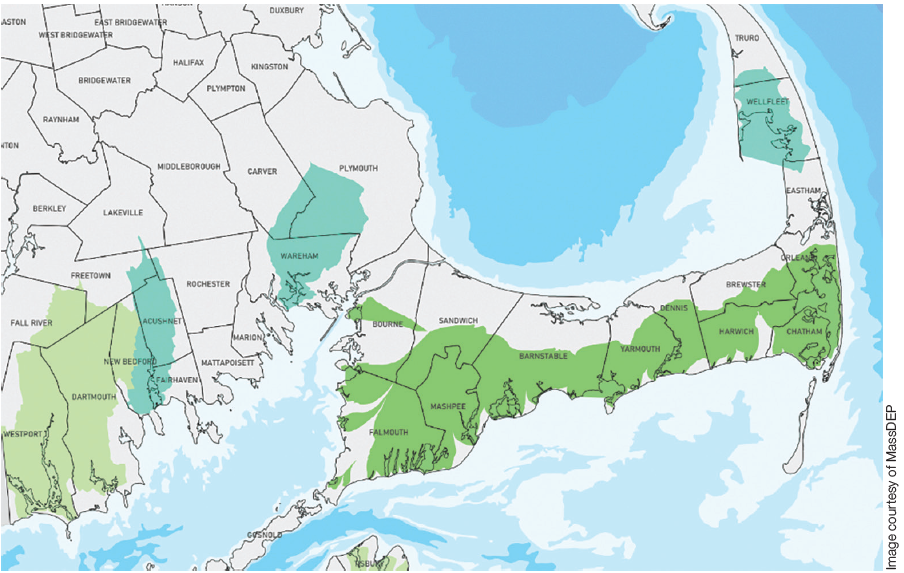 Property Owners Subject to Septic Upgrades
Property Owners Subject to Septic Upgrades
By Christopher R. Vaccaro
Special to Banker & Tradesman

Changes are coming to regulations affecting wastewater management on Cape Cod and southeastern Massachusetts, but the scope of these changes and their potential impact on property owners are still taking shape.
The Massachusetts Department of Environmental Protection is responsible for regulating private on-site sewage disposal systems, commonly known as septic systems. For decades, DEP has regulated septic systems through Title 5 of the State Environmental Code. Conventional septic systems collect wastewater in watertight septic tanks where solids, grease, and fats are separated from liquids, and partial treatment of solid waste occurs. Liquids are then distributed over subsurface leaching fields, where microbial action removes some pollutants before the liquids seep into the soil and groundwater.
Nitrogen, usually in the form of ammonia, is a major pollutant found in wastewater. Septic systems are designed to use bacteria to convert nitrogen compounds into harmless nitrogen gas, a relatively inert molecule that is the primary component of the earth’s atmosphere. However, conventional septic systems only reduce nitrogen pollution by an unimpressive 5 to 10 percent. The untreated pollutants seep into the groundwater, and often into nearby wetlands. The results of incomplete pollutant reduction are notable on Cape Cod, where water quality in many harbors, estuaries and marshes is already significantly degraded, and getting worse.
To address this problem, DEP seeks to enhance pollution prevention standards on septic systems serving Cape Cod and southeastern Massachusetts, by amending Title 5 and adding new watershed permit regulations. DEP’s initiative would identify watersheds vulnerable to nitrogen pollution, and designate them as “nitrogen sensitive areas”
(NSAs). DEP has not completed its designation of NSAs, but towns on Cape Cod from Bourne to Orleans would certainly have NSAs, and much of Martha’s Vineyard, Nantucket and the western shore of Buzzards Bay would likely be included. DEP’s proposed amendment to Title 5 would require all septic systems located in NSAs, including existing systems, to be upgraded to employ “best-available nitrogen-reducing technology” within five years.
However, if a community obtains, or files a notice of intent for, a “watershed permit” from DEP, the community’s property owners would be exempt from the upgrade requirement.
Expensive New Technology Required
DEP’s website offers helpful information on different kinds of septic systems that use the best available nitrogen-reducing technology, or BAT, for short. BAT systems can reduce nitrogen pollutants by over 70 percent, a significant improvement over the lackluster performance of conventional systems.
But BAT systems are expensive, and may cost over $35,000 each. If thousands of property owners are required to install BAT systems, the overall financial burden would be exorbitant. Whether there are enough qualified professionals available to complete thousands of upgrades within five years is questionable. The upgrade mandate would also likely have an adverse effect on construction and housing costs on Cape Cod. State government would probably have to create new funding sources and loan programs for property owners to pay for upgrades.
DEP is sensitive to these concerns. The proposed regulations would offer communities a way to shift the upgrade requirement from individual property owners to the community in general, using watershed permit regulations. Under DEPs proposed regulations, communities could seek a 20-year permit to implement long-term wastewater planning for entire watersheds. This would give communities time to develop innovative approaches to better wastewater management, including possible expansions of public sewer systems. Individual property owners would not be required to upgrade their septic systems during the 20-year period that the watershed permit is in effect.
Communities seeking watershed permits would be expected to commit to wastewater management plans demonstrating that at least 75 percent of the necessary pollutant reduction levels would be achieved within 20 years. Those communities would have to provide annual progress reports to DEP, and implement adaptive management programs to produce the necessary reductions. If a community fails to satisfy the requirements of its watershed permit, DEP could terminate or revoke the permit and reimpose the Title 5 upgrade requirement on individual property owners. DEP’s initiative is clearly intended to encourage communities to take a holistic and proactive approach to wastewater treatment in NSAs, so individual property owners are not saddled with upgrade costs.
DEP held public meetings last year and in January seeking comments on its proposed regulations. While many participants at those meetings expressed concerns about upgrade costs, many others supported DEP’s efforts to improve water quality on Cape Cod. The time for comments is now over, and Cape communities will soon learn what will be expected of them to achieve that goal.
Download the article as seen in Banker & Tradesman on March 27, 2023. Learn more about Christopher R. Vaccaro.